MercoPress. South Atlantic News Agency
Tag: Mario Dragui
-
Saturday, January 3rd 2026 - 08:24 UTC
Europeans are all Peronists now, where are the leaders willing to make hard choices?
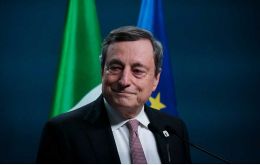
By Cristina Martinez (*) - European voters increasingly resemble their Argentinian counterparts, who, until recently, believed the unsustainable promises offered by Peronist politicians. To avoid the economic shock therapy that has befallen Argentina, Europe’s leaders must be willing to make hard choices, and electorates must be willing to reward them for it.
-
Friday, December 4th 2015 - 07:25 UTC
Dragui's fresh Euro stimulus measures don't convince markets

The European Central Bank announced on Thursday fresh stimulus measures in a bid to boost inflation and the Euro zone’s recovery but the market response reflected disappointment. Mario Dragui said the bank was extending the quantitative easing program by six months, March 2017, or beyond if necessary, but at the current rate of 60 billion Euros a month.
-
Thursday, April 16th 2015 - 08:54 UTC
The 1.1 trillion Euro bond buying program is 'effective' says ECB' president Dragui

A protester crashed a press briefing as the European Central Bank (ECB) explained the success of its 1.1 trillion euro bond buying plan. ECB President Mario Draghi said: “There is clear evidence that the monetary policy measures we have put in place are effective.”
-
Tuesday, September 2nd 2014 - 08:36 UTC
Dragui and Hollande agree to spur demand and head off the risk of deflation
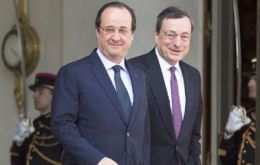
French President Francois Hollande and Mario Draghi the head of the European Central Bank (ECB) have agreed that European demand must be lifted to head off a risk of deflation, French officials said.
-
Wednesday, June 4th 2014 - 08:51 UTC
Euro zone entering 'deflation' zone; ECB expected to boost growth
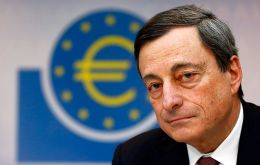
Euro-zone inflation fell to 0.5% in May, down from 0.7% in April and well below the European Central Bank's 2% target. The fall means the ECB will be expected to take steps to boost growth and counter the threat of deflation when it meets on Thursday.
-
Thursday, March 6th 2014 - 21:07 UTC
Fearing deflation Euro bank leaves interest rate unchanged at record low

The European Central Bank (ECB) kept on Thursday its benchmark interest rate at its record low of 0.25%, despite fears inflation could get stuck in a “danger zone” below 1%. The bank slightly raised its forecast for growth to 1.2% in 2014, but dropped its inflation estimate.
-
Thursday, June 6th 2013 - 23:12 UTC
Dragui forecasts Euro-area return to growth by end of 2013

European Central Bank President Mario Draghi said on Thursday that the Euro-area economy will return to growth by the end of the year, handing policy makers a reason to hold back fresh stimulus. Draghi spoke after the ECB Governing Council in Frankfurt left its main refinancing rate at 0.5% after reducing it by a quarter points last month.
-
Thursday, July 12th 2012 - 22:35 UTC
ECB zero deposit-rate shakes EU banking system and forces to look for alternatives
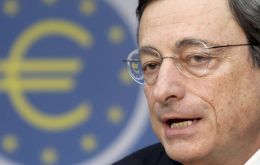
European Central Bank's new zero deposit rate had an instant impact as it came into force, with banks more than halving the amount of cash parked there overnight and one ECB policymaker saying he expected the move to increase banks' lending.
-
Thursday, July 5th 2012 - 22:22 UTC
ECB lowers interest to record low 0.75%; pushes banks to lend by cutting overnight rate to zero

The European Central Bank cut its key interest rate by a quarter percentage point Thursday to a record low 0.75% to try to help ease Europe’s financial crisis, boost its sagging economy and restore confidence.
-
Friday, May 4th 2012 - 00:36 UTC
ECB calls on governments to put “growth at the centre of the agenda”
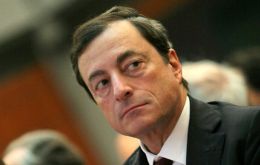
The European Central Bank, meeting in Spain on Thursday, held interest rates at historic lows but insisted it was up to governments to find ways of boosting growth without busting fiscal rules.
